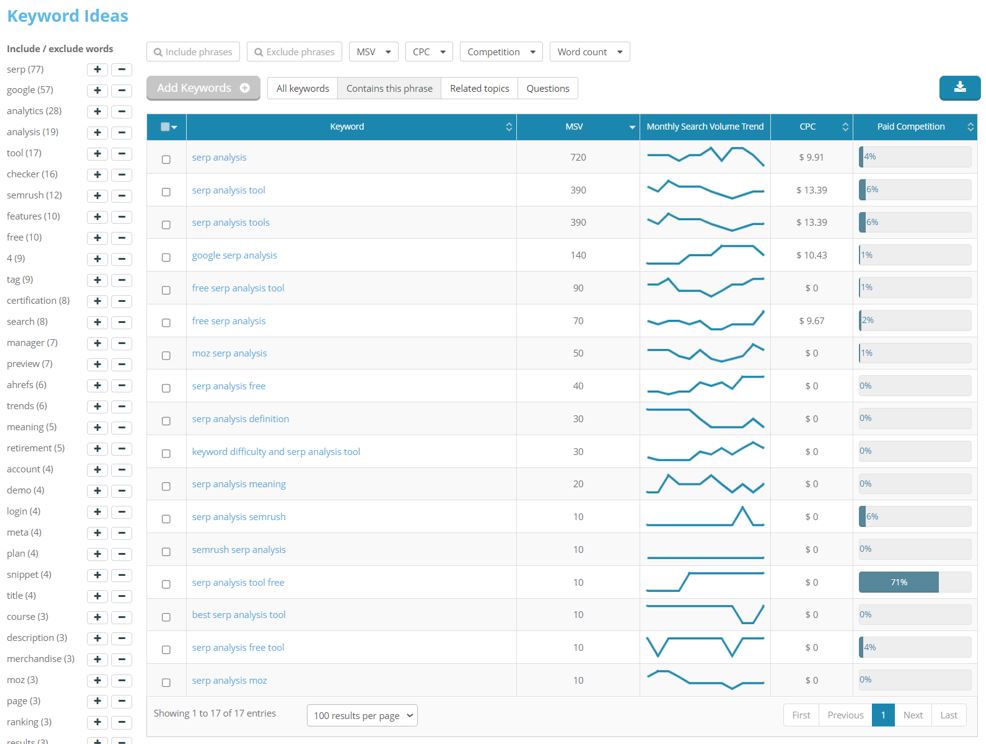Uncover the secrets to dominating search engine results with expert SERP analysis techniques. Boost your website’s performance today!

Image courtesy of via DALL-E 3
Table of Contents
Introduction to SERP Analysis
SERP, which stands for Search Engine Result Pages, is a vital component for anyone looking to enhance their website’s visibility on search engines. Understanding SERP and how it functions can give you valuable insights into how your website appears when people conduct searches online.
What is SERP?
SERP is essentially the page you see after typing in a search query on a search engine like Google. It displays a list of results that are relevant to your search terms. This page layout includes various elements such as titles, URLs, meta descriptions, and more.
Why is SERP Important?
Knowing how SERP works is crucial because it allows website owners and content creators to see how their website or article is showcased when people are searching for information online. By understanding SERP, you can optimize your content to improve its visibility and ranking on search engines.
Basic Elements of a SERP
When you search for something on Google, have you ever wondered what appears on the page? That’s called a SERP or Search Engine Result Page. Let’s dive into the different components that make up a SERP.
Title
The title of a search result is the first thing you see when you look at a SERP. It needs to be catchy and relevant to grab your attention. A good title can make you want to click on the link to learn more about the content.
URL
The URL is the web address that shows where the link will take you. It’s important for the URL to be easy to read and understand. A clear URL helps users know where they’re going before clicking on the link.
Meta Description
The meta description is a brief summary of what the content on the webpage is about. It gives you a peek into what you’ll find if you click on the link. A well-written meta description can entice you to explore further.
Snippets
Snippets are small pieces of information that give you a glimpse into the content of the webpage. They can include a brief summary, images, or other details that help you decide if the link is relevant to what you’re searching for.
How to Analyze SERP
When it comes to understanding how your website performs on search engines, analyzing SERP (Search Engine Result Pages) is key. By following some simple steps, you can gain valuable insights into your online presence and see where improvements can be made.

Image courtesy of www.theegg.com via Google Images
Identify Your Competitors
To begin analyzing SERP, it’s important to identify who your online competitors are. These are the websites that rank high for the same keywords you are targeting. By looking at their content and strategies, you can learn valuable information on how to improve your own ranking.
Check Your Ranking
Next, check where your website currently ranks in the search results. This will give you a baseline to measure your progress against after making any optimizations. Tools like Google Search Console or third-party SEO tools can help you track your position for specific keywords.
Evaluate Content Quality
Another vital step in analyzing SERP is evaluating the quality of content on the front page results. Take a closer look at what type of content is ranking well for your target keywords. Is it long-form articles, videos, or infographics? Understanding this can help you tailor your content strategy for better results.
Understanding Keywords in SERP
Keywords are the words or phrases that people type into a search engine when looking for information. They are like the key to unlocking the right door on the internet. For example, if you are searching for the best pizza in town, you would type in keywords like “best pizza near me”. These keywords help search engines like Google understand what you’re looking for and show you relevant results.
Finding Relevant Keywords
When it comes to choosing keywords for your website or content, it’s crucial to pick ones that match what your audience is searching for. You want to use keywords that are relevant to your topic and are commonly used by people in their search queries. By doing this, you increase the chances of your website showing up on the search engine result pages (SERP) when someone searches using those keywords.
Improving Your SERP Rank
In order to boost your website’s visibility and attract more visitors, it’s essential to improve your SERP rank. By utilizing SEO strategies and creating valuable content, you can enhance your position on search engine result pages (SERPs) and increase organic traffic to your site.

Image courtesy of www.theegg.com via Google Images
SEO Basics
SEO, or Search Engine Optimization, is the process of optimizing your website to rank higher in search engine results. By incorporating relevant keywords, meta tags, and high-quality content, you can improve your SERP rank and make it easier for users to find your site online.
Creating Valuable Content
One of the key factors in improving your SERP rank is creating valuable and engaging content that meets the needs of your target audience. By addressing common questions and providing useful information, you can attract more visitors to your site and increase the likelihood of ranking higher in search results.
Using Backlinks
Backlinks are links from other websites that point to your site. They are an important factor in determining your SERP rank, as search engines view backlinks as a sign of credibility and authority. By obtaining high-quality backlinks from reputable sites, you can improve your SERP rank and drive more traffic to your website.
Common SERP Features
Rich snippets are extra pieces of information displayed alongside regular search results. These could be star ratings, prices, or even images that provide users with a more detailed preview of the webpage before clicking on it.
Featured Snippets
Featured snippets are highlighted boxes at the top of some search results that aim to provide a direct answer to a user’s query. They are highly sought after by website owners as they can significantly increase visibility and traffic.
Local Pack
The local pack is a feature that showcases a map and a list of local businesses related to a search query. It is especially important for brick-and-mortar stores looking to attract customers in their area.
Knowledge Graph
Google’s Knowledge Graph is a database of interconnected facts and information that enables quick answers to user queries without having to click on a specific website. It aims to provide users with immediate and relevant information directly on the search results page.
Tools for SERP Analysis
When it comes to mastering SERP analysis and improving your search engine performance, having the right tools at your disposal can make a significant difference. These tools are designed to give you valuable insights into how your website is performing on search engine result pages (SERPs) and help you make data-driven decisions to enhance your online visibility.

Image courtesy of seobase.com via Google Images
Popular Analyzing Tools
There are several popular tools available that can assist you in analyzing SERPs effectively. One such tool is SEMrush, which provides a comprehensive overview of your website’s performance, keyword rankings, and competitor analysis. Another popular tool is Ahrefs, which offers detailed insights into backlink profiles and keyword research.
Additionally, Moz’s MozPro tool offers valuable features like site audits and rank tracking to help you monitor your SERP performance. These analyzing tools are essential for identifying areas of improvement and understanding how your website compares to your competitors in the search results.
Free Tools
For those on a budget or looking for no-cost options, there are also free tools available that can provide valuable SERP analysis insights. Google Search Console is a powerful tool offered by Google that helps you monitor your website’s presence in Google search results, identify indexing issues, and optimize your content for better visibility.
Another useful free tool is AnswerThePublic, which provides insights into the questions people are asking related to your keywords. This can help you tailor your content to match what users are searching for and improve your chances of appearing in relevant SERPs.
By utilizing both paid and free tools for SERP analysis, you can gain a comprehensive understanding of your website’s performance on search engines and implement strategies to boost your rankings in the SERPs.
Tracking Your Progress
Once you’ve implemented strategies to improve your search engine result page (SERP) performance, it’s crucial to track how these changes are affecting your website’s visibility. One of the most effective ways to do this is by utilizing website analytics tools. These tools provide valuable insights into your website’s traffic, user behavior, and keyword performance.
By analyzing the data from these tools, you can see how your website is ranking for specific keywords, which pages are receiving the most traffic from search engines, and how users are interacting with your content. This information can help you identify areas for improvement and make informed decisions about adjusting your SERP optimization strategies.
Making Adjustments
Tracking your progress through analytics is just the first step. It’s equally important to use the insights gained from these tools to make adjustments to your strategy. If you notice that certain keywords are not performing well, you may need to optimize your content further or target different keywords altogether.
Additionally, monitoring your SERP rankings over time allows you to see how your website’s visibility is changing and whether your efforts are yielding positive results. If you see a drop in rankings, it may be time to reassess your SEO tactics and make necessary adjustments to regain lost ground.
Conclusion
In this article, we explored the world of SERP analysis and how it can significantly impact your website’s performance on search engines. By understanding the basic elements of a SERP, analyzing your competitors, and improving your content, you can enhance your search engine rankings and attract more organic traffic to your site.

Image courtesy of seowind.io via Google Images
Keywords play a crucial role in determining your visibility on search engine result pages. By selecting relevant keywords and creating valuable content around them, you can increase the chances of your website appearing higher in the SERPs.
Additionally, we discussed common SERP features such as rich snippets, featured snippets, local pack, and knowledge graph. These features can provide valuable information to users and help you stand out in search results.
Using tools for SERP analysis can further optimize your strategies and help you track your progress over time. By making adjustments based on the insights gained from these tools, you can continuously improve your SERP performance and stay ahead of the competition.
Overall, mastering SERP analysis is a vital component of any successful digital marketing strategy. By implementing the tips and techniques outlined in this article, you can boost your search engine performance and reach a wider audience online.
Want to turn these SEO insights into real results? Seorocket is an all-in-one AI SEO solution that uses the power of AI to analyze your competition and craft high-ranking content.
Seorocket offers a suite of powerful tools, including a Keyword Researcher to find the most profitable keywords, an AI Writer to generate unique and Google-friendly content, and an Automatic Publisher to schedule and publish your content directly to your website. Plus, you’ll get real-time performance tracking so you can see exactly what’s working and make adjustments as needed.
Stop just reading about SEO – take action with Seorocket and skyrocket your search rankings today. Sign up for a free trial and see the difference Seorocket can make for your website!
Frequently Asked Questions (FAQs)
Why is SERP Analysis important?
SERP analysis is crucial because it helps you understand how your website or article appears on search engine result pages (SERPs). By analyzing SERPs, you can see where your content ranks, how your competitors are performing, and what changes you can make to improve your search engine performance. Knowing how your content shows up in search results can help you optimize it for better visibility and attract more organic traffic to your website.
How often should I check my SERP rankings?
It is recommended to check your SERP rankings regularly to stay updated on how your content is performing in search results. Depending on how competitive your industry is and how frequently you publish new content, checking your rankings once a week or once every two weeks can give you a good indication of your SEO progress. By monitoring your SERP rankings consistently, you can track the impact of your optimization efforts and make necessary adjustments to improve your search engine performance.







